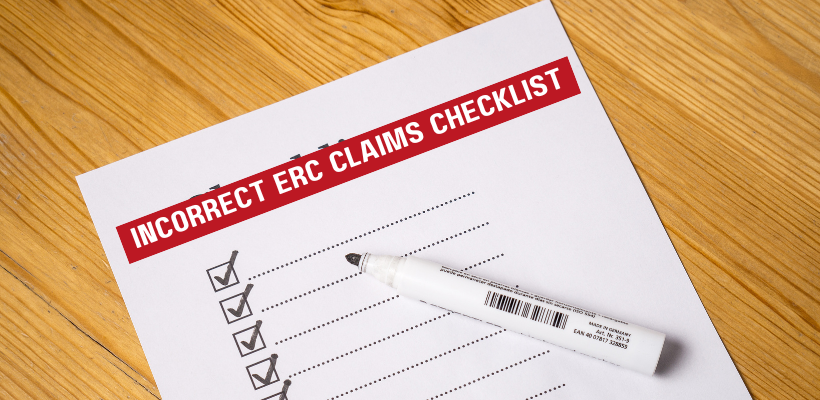In a July 2024 article published by the IRS, additional warning signs have been identified for incorrect Employee Retention Credit (ERC) claims. These updates come as part of the IRS’s ongoing effort to ensure that businesses claiming the ERC are doing so accurately.
Sidenote: these “red flags” are the main reason why ERC approval wait times are so long.
If you’re a business owner who claimed the ERC, it’s important to ensure your claim is accurate. Here’s a straightforward guide to help you understand these red flags and avoid potential issues.
Previously Identified Warning Signs
- Over-claiming quarters:
Some promoters encouraged businesses to claim the ERC for every quarter the credit was available, regardless of actual eligibility. This practice is unusual and should be carefully reviewed. - Non-qualifying government orders:
Claims based on government orders that did not directly affect business operations or were not due to the COVID-19 pandemic are problematic. The order must have specifically impacted your operations to qualify. - Incorrect employee counts and calculations:
Errors in calculating the ERC can occur if businesses claim credit for wages that don’t meet ERC requirements or apply the same credit amount across different periods incorrectly. - Supply chain issues:
Simply experiencing supply chain disruptions does not qualify a business for the ERC unless these disruptions were caused by government orders affecting operations. - Claiming for entire quarters:
Businesses that claimed the ERC for entire quarters when only part of the quarter was eligible have overclaimed. The credit should only be for wages paid during the period of suspension. - Non-existent or non-paying businesses:
Claims from businesses that did not exist or did not pay wages during the eligibility period are invalid. - Promoter claims of no risk:
Be wary of promoters who claim there’s no risk in claiming the ERC. Incorrect claims can lead to audits, penalties, and repayment demands.
Newly Identified Warning Signs as of July 2024
- Essential businesses claiming ERC:
Essential businesses that continued to operate fully during the pandemic might not qualify for the ERC if they were not significantly impacted by government orders. Claims from such businesses need careful scrutiny. - Lack of proof for business suspension:
If a business cannot provide adequate documentation showing how government orders led to a suspension of operations, the ERC claim may be invalid. - Family member wages:
Wages paid to family members, such as spouses or children, are not eligible for the ERC. Claims including these wages are likely incorrect. - PPP loan forgiveness overlap:
Businesses that received PPP loans and had them forgiven cannot claim the ERC on the same wages used for loan forgiveness. Ensure your ERC claim only covers wages not used for PPP forgiveness. - Large employers claiming for active employees:
Large employers can only claim ERC for wages paid to employees who were not providing services. Claims that include wages for active employees are ineligible.
Final Thoughts
The IRS is ramping up efforts to catch incorrect claims, making it more important than ever to ensure that your ERC claim is accurate. Inaccurate claims can lead to significant penalties, lengthy audits, and a loss of credibility with tax authorities. By reviewing your claim thoroughly, you can protect your business from potential complications.
Remember, correcting any errors now can save you from more serious repercussions down the line. Taking these proactive steps not only helps you stay compliant but also reinforces your commitment to proper business practices. If you need assistance or have any concerns about your ERC claim, don’t hesitate to reach out to us at (305) 564-9199. You may also fill out our website contact form and schedule a free and confidential consultation today.







 Steven N. Klitzner, P.A. is a tax attorney based in Miami, Florida. He has been practicing tax law for over 40 years, and currently holds a 10.0 rating by Avvo. Mr. Klitzner was appointed to the IRS Service Advisory Council in 2021 and is...
Steven N. Klitzner, P.A. is a tax attorney based in Miami, Florida. He has been practicing tax law for over 40 years, and currently holds a 10.0 rating by Avvo. Mr. Klitzner was appointed to the IRS Service Advisory Council in 2021 and is... 





